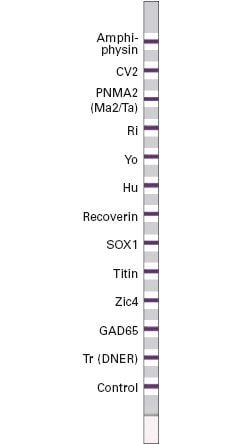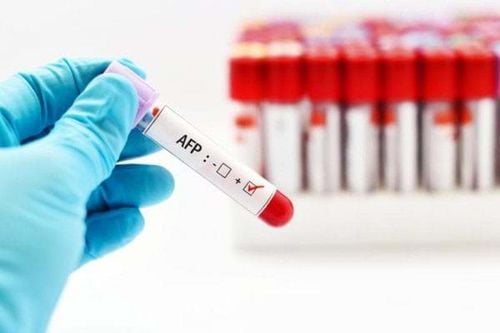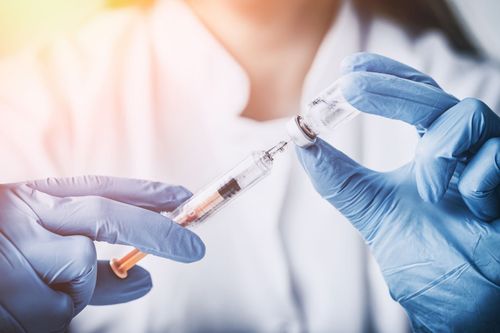This is an automatically translated article.
The article was written by Doctor Le Duy Cuong - Biochemistry Unit - Laboratory Department - Vinmec Times City International General Hospital.Paraneoplastic syndromes occur in about 15% of malignancies, especially lung cancer. The oto-optical neuroma syndrome is often derived from brainstem inflammation and/or cerebellar degeneration.
1. What is paraneoplastic syndrome?
Paraneoplastic Neurological Syndromes (PNS) are diseases of the central and peripheral nervous systems that are directly related to tumor growth. However, these diseases are not directly caused by the tumor, its metastasis, or as a side effect of treatment with cytosuppressive drugs or radiation.Depending on the tumor type, cancer cells produce antigens such as Amphiphysin, CV2/CRMP5, PNMA2 (Ma2/Ta), Ri, Yo, Hu, ZIC4 or Tr (DNER) and antibodies This antigen can produce specific autoimmune antibodies.
These autoantibodies bind to their antigens in nerve tissues and thus cause neurological disorders, hence the term paraneoplastic syndromes.
Known since 1985, when anti-Hu was first described, more than two-thirds of PNS patients had the presence of neuronal-associated autoantibodies in the blood. Antigen-antibody reactions not only demonstrated paraneoplastic etiology by nearly 100%, but they were also closely associated with specific tumorigenesis that had not yet been detected in patients. . Therefore, the detection of PNS autoantibodies becomes very useful in the diagnosis of early-stage tumors.
2. The relationship between paraneoplastic syndromes and physical diseases

PNS xảy ra nhiều ở ung thư buồng trứng
Paraneoplastic syndromes (PNS) can develop from a variety of immune responses to neuroblastoma antigen proteins (anti-Hu, anti-Ri, anti-Yo) or from antigens not yet Are known.
PNS occurs most often in small cell lung cancer , breast cancer , ovarian cancer . Lambert-Eaton myasthenic syndrome, the most common PNS and can be diagnosed by the detection of anti-Purkinje cell antibodies, has the highest predictive value for tumor (here, small cell lung cancer) .
In paraneoplastic syndromes (limbinal encephalitis, cerebellar degeneration, eye twitching syndrome of unpredictable directions - involuntary muscle twitches with cerebellar ataxia - POMA, retinal pathology sclerosus ) the detection of specific antibodies has a much higher value in predicting tumor occurrence than the clinical symptoms caused by them.
PNS is not only present with malignancies but also occurs in autoimmune diseases such as insulin-dependent diabetes, detection of anti-GAD65 is very important in early diagnosis of type 1 diabetes and identification. high-risk individuals.
3. Diagnostic tests

Xét nghiệm EUROLINE Paraneoplastic Neurologic Syndrome 12 Ag (IgG)
Identification of autoantibodies is important in the diagnosis of paraneoplastic syndromes. In cases of suspected paraneoplastic syndrome, all established and specific antibodies should be tested.
EUROLINE Paraneoplastic Neurologic Syndrome 12 Ag (IgG) test is the first test that allows simultaneous automatic analysis of 12 neurospecific autoantibodies (IgG) including: Amphiphysin, CV2, PNMA2 (Ma2/Ta). ), Ri, Yo, Hu, Recoverin, SOX1, Titin, Zic4, GAD65 and Tr (DNER). The test is performed completely automatically on the EUROBlotOne system at the Laboratory Department - Vinmec International General Hospital.
4. The link between autoantibodies and neurological syndromes and cancer
Vinmec International General Hospital is one of the hospitals that not only ensures professional quality with a team of leading medical doctors, modern equipment and technology, but also stands out for its examination and consultation services. comprehensive and professional medical consultation and treatment; civilized, polite, safe and sterile medical examination and treatment space. Customers when choosing to perform tests here can be completely assured of the accuracy of test results.
Customers can directly go to Vinmec Health system nationwide to visit or contact the hotline here for support.














